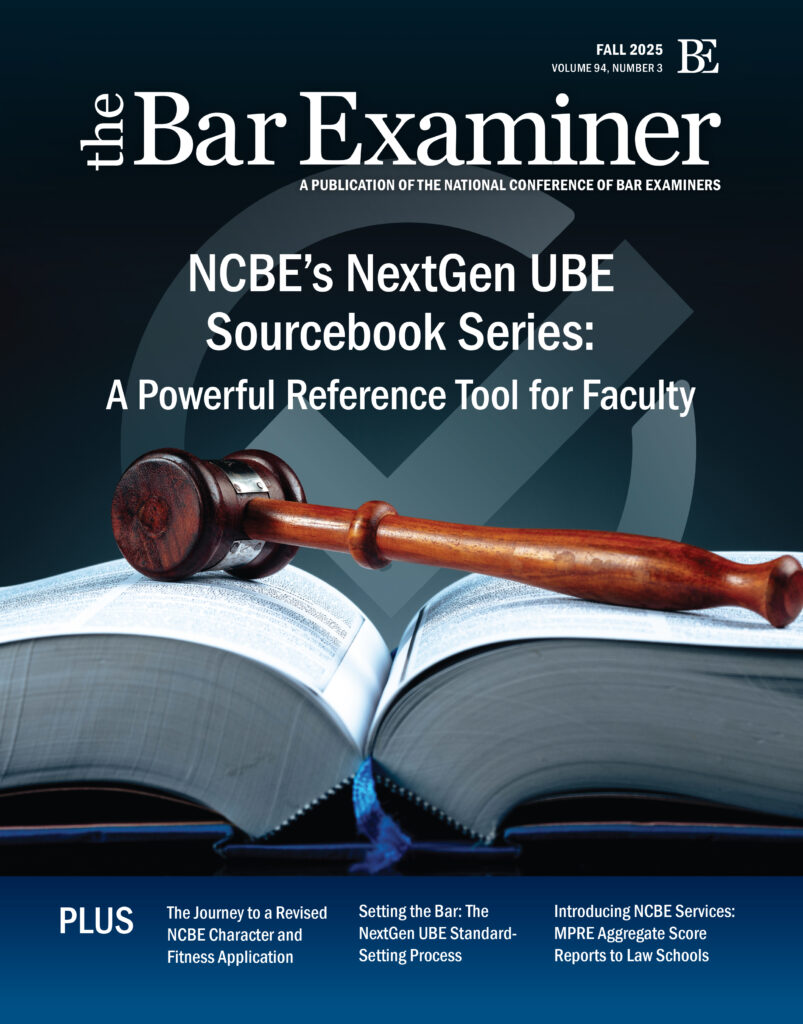This article originally appeared in The Bar Examiner print edition, Fall 2024 (Vol. 93, No. 3), pp. 34–35.By Dawn FigueirasStudents entering law school this 2024–2025 academic year will be among the first graduates to sit for the NextGen bar exam. Are law schools prepared for the change?
The Appalachian School of Law (ASL) recently completed a two-year self-assessment process to examine its curriculum’s suitability for preparing graduates to succeed on the NextGen bar exam and to develop and adopt a NextGen curriculum. Changes to the first-year curriculum have been implemented for the class that arrived on campus in fall 2024. You may be wondering how ASL was able to assess and update its curriculum already. For a full examination of the process, you can read “Toward a NextGen Curriculum,” which is forthcoming in Rutgers Law Record.1 Here, I offer a brief summary.
ASL began by studying the differences between the Uniform Bar Exam and the NextGen bar exam. If you have been following NextGen development, you know one of the key changes is the increased focus on testing practical skills, which NCBE has labeled “Foundational Skills.” The first step in ASL’s process was a curriculum-mapping exercise, conducted via faculty survey, focusing on how each course at ASL addressed its current Program Learning Outcomes. NCBE published preliminary and revised content scope documents for the new exam, which cover “the breadth of material to be covered in the areas of legal knowledge and categories of practical skills and abilities that will be tested on the NextGen bar exam.”2 ASL used that information to complete a similar faculty survey of every required course to gauge how well the 27 skills laid out in the content scope were being addressed already.
Other significant changes in the NextGen exam are the reduction from 12 tested subject areas to 8, and less reliance on memorized rules of law.3 While ASL faculty members assessed the teaching of practical skills, they were simultaneously reviewing the content scope for their doctrinal areas to assess how the narrower scope of memory-tested topics on the NextGen exam may affect their existing course plans.
ASL’s Curriculum Committee reviewed survey data to identify the skills that were already being sufficiently addressed in the required curriculum. Fourteen were found to be adequately incorporated into the required curriculum. The committee took skills requiring further attention and grouped them by similarity. For example, four skills were related to dispute resolution. Although ASL has traditionally offered elective courses on this topic, it decided to offer additional courses and to require students to complete at least one designated Dispute Resolution Skills course prior to graduation.4
A full description of ASL’s NextGen curriculum is beyond the scope of this article, but important changes include requiring a practicum course in the first year of law school, adding required doctrinal courses, developing a third-year Lawyering Skills course for teaching more practical skills, and requiring an elective that includes a focus on statutory/regulatory interpretation. Those interested in further details can visit ASL’s website for links to the surveys used and resulting data summaries from ASL’s process, and can read the above-mentioned forthcoming article for a fuller explanation of the process and results.
Notes
- See Dawn Figueiras, “Toward a NextGen Law School Curriculum,” 52 Rutgers Law Record (forthcoming 2024), available at http://lawrecord.com. (Go back)
- The documents can be found here: https://nextgenbarexam.ncbex.org/reports/content-scope/. (Go back)
- Starting in July 2028, family law will be included as a ninth subject area in the foundational concepts and principles tested on the NextGen bar exam. (Go back)
- For more about ASL’s process for standardizing and designating the Dispute Resolution Skills courses, the forthcoming article in Rutgers Law Record, especially Section C(3)(a)(ii), will offer further details, including links to the required learning outcomes (keyed to the Foundational Skills), the forms used by faculty members to seek designation of a course as fulfilling the requirement, and lists of courses already approved by ASL’s faculty as meeting the designation. (Go back)
 Dawn Figueiras is an Assistant Professor at Appalachian School of Law, where she serves as the Curriculum Committee Chair and as Associate General Counsel to the Law School. Professor Figueiras graduated from the William & Mary School of Law in 2000 and began teaching full time in 2018, after actively practicing law in Virginia, Tennessee, and the District of Columbia.
Dawn Figueiras is an Assistant Professor at Appalachian School of Law, where she serves as the Curriculum Committee Chair and as Associate General Counsel to the Law School. Professor Figueiras graduated from the William & Mary School of Law in 2000 and began teaching full time in 2018, after actively practicing law in Virginia, Tennessee, and the District of Columbia.
About the Next Generation of the Bar Exam
Set to debut in July 2026, the NextGen bar exam will test a broad range of foundational lawyering skills, utilizing a focused set of clearly identified fundamental legal concepts and principles needed in today’s practice of law. The skills and concepts to be tested were developed through a multiyear, nationwide legal practice analysis, focused on the most important knowledge and skills for newly licensed lawyers. Designed to balance the skills and knowledge needed in litigation and transactional legal practice, the exam will reflect many of the key changes that law schools are making today. NCBE is committed to ensuring a systematic, transparent, and collaborative implementation process, informed by input from and participation by stakeholders, and guided by best practices and the professional standards for high-stakes testing. For more information, visit nextgenbarexam.ncbex.org/.







